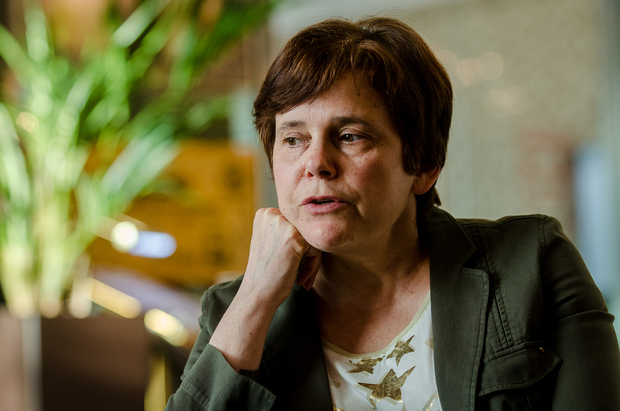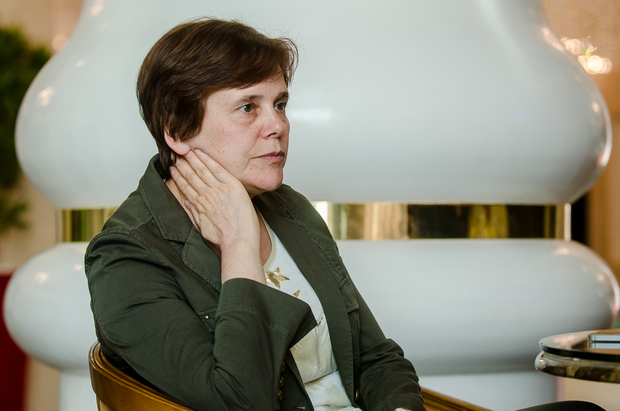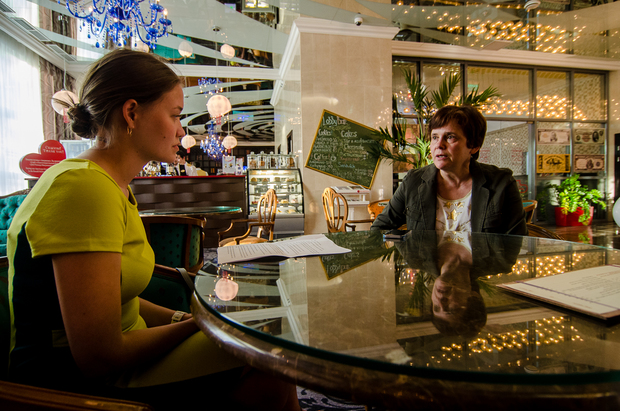Irina Prokhorova: ‘I'm glad that despite everything RBK continues to operate and doesn’t betray the principles’
The sister of the oligarch Mikhail Prokhorov tells about the dissolution of Civic Platform and the use of Dissernet
Irina Prokhorova, the sister of a billionaire Mikhail Prokhorov, the founder of the Prokhorov Fund, a Russian specialist in Literature studies, the chief editor of the 'New literary review' and the head of the publishing house with the same name gave a lecture at the book festival 'Smena' held last weekend. The correspondent of Realnoe Vremya met with Irina Prokhorova on the day of her visit to Kazan and took the exclusive interview. They talked about culture, about her relationship with her brother, and many other topics.
The first question concerns the Prokhorov Fund — the Kazan Youth Theatre also won its grant. Could you tell us how has the cultural life of the country changed since the day of its foundation, i.e. since 2004?
'From the very beginning, the charity fund of Mikhail Prokhorov declared the support of culture in the Russian regions as its main task. It was a conscious and principled position, because in the regions for the culture it is much harder to live and grow. Our backbone region is Krasnoyarsk Krai (there is located the main company where Prokhorov has a share – editor's note) but over time a number of grant competitions and projects spread to other regions. One of the important directions of our activity is the support of the theatre because the theatre is an important social and cultural institute, the finest barometer of public sentiment. We have the competition, which has been operationg for many years, it is called 'New Theatre'. We give grants to the regional theaters for new performances, for the invitation of young talented directors. We understand that the theatres have small budget, a failed experiment may lead to a big trouble, but the theater life cannot exist without creative searches. We give theatres a chance to risk and experiment, and by the way, it works, most of these experiments are successful: many performances that we support gain attention of the Golden Mask, they become its laureates. For many years we hold our own theatrical festival in Krasnoyarsk 'Theatre Syndrome'.
If to list all the programmes of the Fund, an evening will not be enough, so I will mention only the main directions of our activity. In addition to the support of the theatre, we have a big block of events 'Book world'. It includes the annual Krasnoyarsk book culture fair, which this year will be held for the tenth time; the Literature Award 'NOS' ('New Literature'), the grant competition 'The Libraries face education', the international program TRANSCRIPT (the support of the translation of Russian Literature into foreign languages). The third area is the support of contemporary art. A separate important area is the assistance to the socially vulnerable groups.

We give theatres a chance to risk and experiment, and by the way, it works, that most of these experiments are successful: many performances that we support gain attention of the Golden Mask, they become its laureates
If we talk about literature, we are interested in your opinion: does the political situation affect the quality of literature?
Censorship and unfavorable political climate, of course, affect the development of literature. During the Soviet times, the talented writers could not freely publish their works, their texts were mutilated for the sake of political environment, they were forced to write sponsored works on 'the production topics', so they had to write 'for the desk drawer' or to be engaged in self-publishing, or be published abroad, for which they were persecuted, declaring them as traitors and anti-Soviets. The 1990s became the heyday of belletristic literature, when the state ceased to interfere in the artistic process and to relegate literature to a submissive servant of ideology. In the late 1980s, the first private publishing houses were opened, which rapidly began to fill the vast gaps in the reader's demand, formed during the years of total control over society. The reader's hunger spread to almost all genres and formats: entertainment, children's, experimental, educational, professional literature, etc.
What do you think about the situation with RBC?
This is a dramatic story, which nowadays, unfortunately, is repeated more often. I'm glad that despite everything the RBC continues to operate and does not betray its principles.
'Pretty soon it turned out that Just Cause is thoroughly corrupt, incompetent and cannot be reformed'
The next question is personal one. In one of your interviews I read that you literally raised Mikhail Prokhorov.
I would not put the question like that, but the older sister (I am 9 years older) up to a certain moment, of course, is authority for her younger brother. Now it is in the distant past, and in many respects Mikhail can rightfully be considered the older brother. I am grateful to our parents for what they helped us become friends, despite the difference in age and in professions. The latter, however, is rather an advantage than a disadvantage: getting familiar with different areas of social activity enriches your knowledge of the world.

Why did he have to close the party? Because in Russia by 2015, unfortunately, the real political life ceased to exist. We see that there is virtually no party competition
Do you participate in the discussions about his business projects?
I'm a philologist, a cultural historian, an editor of Humanities magazine, a publisher. What do I know about big business, what can I advise an entrepreneur of such level? In the Fund, created on the initiative of the brother, I can demonstrate my competence as an expert in the cultural sphere.
Why did Mikhail Prokhorov give up the party activities?
You meant Civic platform? The party Just Cause (Pravoye Delo) existed before Mikhail became an acting politician, and to the moment of his rise to the leadership of the party it was in a deep crisis. Pretty soon it turned out that Just Cause is thoroughly corrupt, incompetent and cannot be reformed, so that the brother left it and created from scratch a new party – Civic Platform. For a short time of its existence, Civic Platform consolidated around itself a powerful intellectual and expert community, achieved considerable success in regional elections and accumulated great potential for further development. Why did he have to close the party? Because in Russia by 2015, unfortunately, the real political life ceased to exist. We see that there is virtually no party competition. Whatever they say from high tribunes about the crystal transparency of our elections, a little linguistic analysis puts everything in the right place. What is a sovereign or managed democracy? This is not a democracy. What is a systemic opposition? Such thing doesn't exist: either the opposition exists or does not. So, our real opposition is not allowed to the political life, and 'the systemic opposition' parties simply ceased to be independent and turned into the factions of the United Russia. In such situation, each party leader faces a choice — either to allow the degeneration of the party or to dissolve it. So brother made difficult but the only right decision — to disband the Civic Platform.
'Some of our lawmakers are in thrall to the worst Soviet remnants: spy mania, lawlessness…'
The State Duma is considering two draft bills, according to which it may happen that many charity funds will be recognized as foreign agents. What is your attitude to this bill?
The law on foreign agents in its essence is completely unconstitutional and deeply immoral. It undermines civil liberties and social activity of citizens, it causes huge damage to the country, destroying the so painstakingly created important public institutions. It is very sad, some of our lawmakers are in thrall to the worst Soviet remnants: spy mania, lawlessness, intolerance, isolationism. Through aggressive media propaganda, our people have formed the wrong idea about the nature and meaning of the activities of foreign charitable organizations that give grants for social and cultural projects. The charity funds around the world are independent institutions that are not subjected to any state department, CIA or other government or supervisory authorities. They observe the laws of their country, and the government does not interfere in their politics and do not dictate their will. After all, nobody persecutes the Russian organization Russkiy Mir abroad and nobody accuses it that under the pretence of promotion of Russian culture in the international community it is engaged in espionage activities. This contradicts basic common sense, so the endless search for enemies and saboteurs — it's an old trick of incompetent managers who do not cope with their duties.

Honestly, our would-be legislators cannot imagine what amount of initiatives are supported by the charity funds, how much the prosperity of our country in terms of health, education, culture depends on the work of such organizations
If charity organizations, like many NGOs that work in hospices, hospitals, with underprivileged children and other disadvantaged groups, will be declared foreign agents, it means that they will also be persecuted and closed, as the human rights organizations. Honestly, our would-be legislators cannot imagine what amount of initiatives are supported by the charity funds, how much the prosperity of our country in terms of health, education, culture depends on the work of such organizations. If now the system of private philanthropy, volunteerism and NGOs is destroyed, we may face a humanitarian disaster. The state has no money, what they confessed by the mouth of the Prime Minister: 'There is no money, but hang in there.' Moreover, in today's mobile world, no state is able to be the sole coordinator and sponsor of various community initiatives. The state apparatus is cumbersome, it can supervise and control only large strategic projects, and if you do not give an initiative to the grassroots, then there will a stagnation of the whole environment. No wonder the economic and cultural level of development of the country is mostly measured by the number of non-governmental charitable and socially-oriented organizations.
You are not going to oppose these bills?
I always oppose such laws, I speak about these problems in the program 'The system of values' (on the RBC-TV channel – editor's note), sign numerous petitions, go on demonstrations. Unfortunately, our society lacks the skills of true consolidation, the ability to achieve the overturning of bad legislative initiatives persistently and consistently. The atomization of people, unbelief in the value of constitutional state — it is the legacy of the authoritarian past of Russia, of which we will have to get rid for a long time.
In those rare cases when the consolidation is possible, a breakthrough happens. For example, a protest rally of the truckers forced the government to make concessions. Or a wonderful initiative called 'Dissernet'. The scientists managed to unite, in spite of the cries and threats of the officials caught with plagiarism, they continue to defend scientific ethics and to reveal fake theses. I must say that the government responded to this initiative and deprived a number of plagiarists of academic titles. They are trying to blame Dissernet almost in undermining the system, but actually it is very helpful to the state, fighting for the competence of scientific and managerial personnel. In this sense, it is far more patriotic action than running around with Ribbons of Saint George, being dressed in the form of the Great Patriotic War.